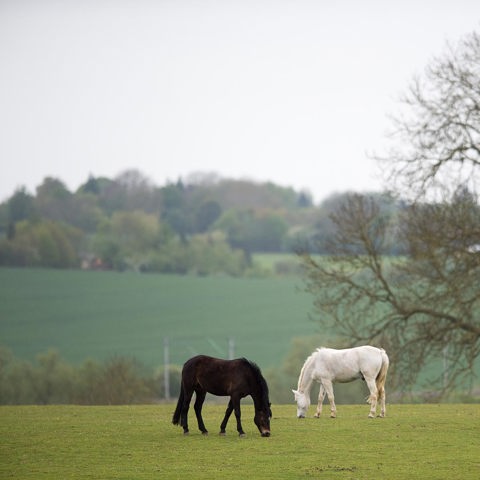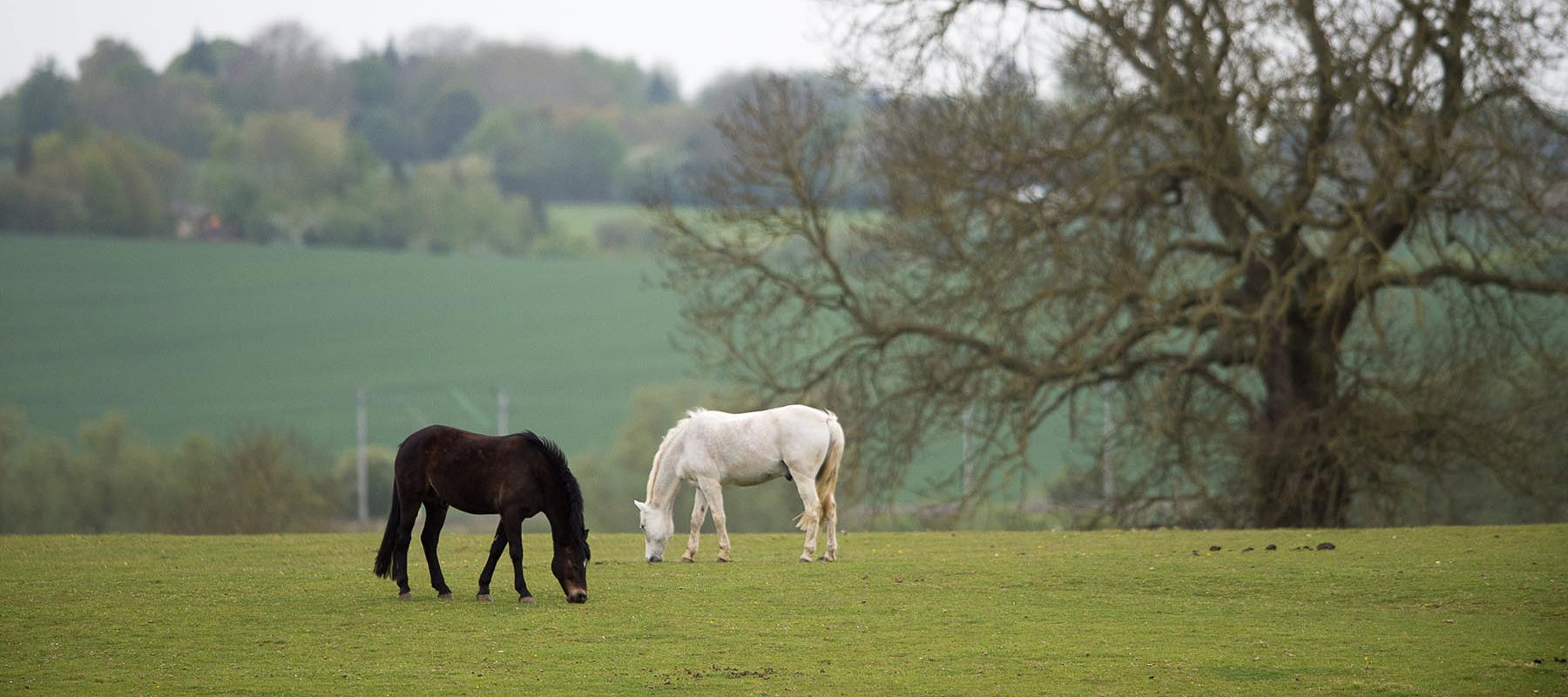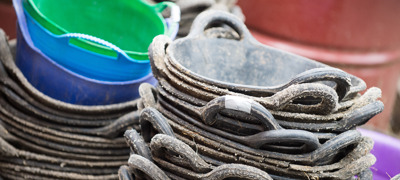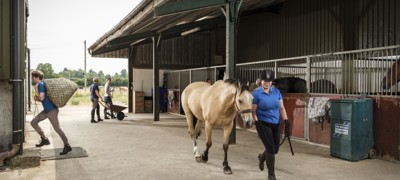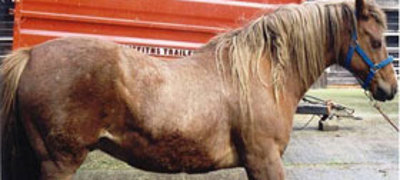Like us, horses require a healthy and balanced diet. A balanced diet should maintain a horse at a healthy weight, provide energy and replicate natural feeding patterns as much as possible. For this reason, it’s important to regularly assess your horse’s weight and condition by fat scoring (also known as body condition scoring). It’s easy to recognise a horse being too thin, but due to the increased risk of health conditions such as laminitis being overweight is just as worrying.
For advice specific to donkey’s visit The Donkey Sanctuary.
Nutrients required for a balanced diet
There are five major nutrients that every horse needs:
- Water - to maintain optimal function and prevent dehydration
- Fibre - to maintain healthy gut function
- Carbohydrates – to provide energy for maintenance and work
- Fats - to help in absorption of nutrients
- Protein - for growth and repair.
Types of feed
Forage
chevron-down
chevron-up
Forage is high fibre and low starch feeds such as hay, haylage, grass and chaffs. Sugar beet is also a type of forage and many feed companies produce fibre-based mixes or pellets. Forage is essential and should form the basis of any horse’s diet as they’ve evolved to eat little and often, chewing for up to 18 hours a day. It’s important to provide enough forage to help satisfy their need to chew and prevent stereotypical behaviours, especially if grass isn’t readily available for example in winter, or when turnout time is restricted. Forage also helps to keep the horse warm, acting as an in-built heating system by creating heat as fibre is broken down in the hindgut.
Forage is vital for a healthy digestive system which will help reduce the risk of colic. Chewing forage stimulates saliva production so the more the horse chews, the more saliva they produce. Horses continuously produce stomach acid, so saliva has an important role by helping to buffer stomach acids and reduces the likelihood of gastric ulceration. Providing a source of forage before a horse is exercised can also help to reduce stomach acid from splashing and causing damage to the lining of the stomach. It’s ideal to provide your horse with adlib (a continuous supply which doesn’t run out) forage at ground level, but this may not be appropriate if daily calories need to be reduced, for example if the horse needs to lose weight. For these horses, slowing down their eating time through enrichment, slow feeder haynets or feeding lower calorie options helps prevent long periods of time spent without eating.
Concentrates
chevron-down
chevron-up
Concentrates or cereals are starch rich, energy-dense grains like oats, barley and maize. Many feed companies produce cereal-based feeds which can vary in energy levels. These are often only needed by horses in medium to hard work, who need to gain weight or have trouble maintaining condition.
Balancers
chevron-down
chevron-up
Balancers are extremely useful if your horse doesn’t need additional energy but still needs help obtaining their full vitamin and mineral intake. Balancers can be fed alongside a high forage diet and as part of a controlled diet.
Feed supplements
chevron-down
chevron-up
There are a range of feed supplements available on the market. These can help support nutritional deficiencies however it’s important to seek guidance from a vet or nutritionist before feeding them to your horse.
Hydration
chevron-down
chevron-up
Water is the main nutrient for the horse’s body and is essential to help regulate the circulatory, lymphatic, digestive and excretory systems and maintaining body temperature. If your horse doesn’t have access to enough water, is unable to drink as the supply has frozen or doesn’t consume enough water, it can affect how food passes along the gut, increasing the risk of impaction colic (occurs when a firm ball of feed material blocks the intestine).
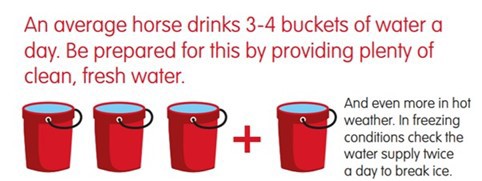
Rules of feeding
These guidelines are a useful reminder of the basics:
- Provide a constant supply of fresh, clean water.
- Feed good quality forage.
- Feed little and often.
- Use good quality feed and store in a clean dry area.
- Feed according to bodyweight and workload.
- Make changes to feed gradually, ideally over 10-14 days to reduce the risk of colic
- Avoid exercising one hour after cereal-based meals. However, it’s always a good idea to make sure your horse has some fibre in their stomachs before exercise to reduce gastric acid splashing against their stomach lining.
- Maintain a consistent routine.
- Practise good hygiene, regularly clean buckets and feed stirrers.
Choosing a forage
Hay and haylage
chevron-down
chevron-up
Hay is a forage which is cut when the grass is fully mature and left to dry out completely before being baled and stored. To preserve hay for as long as possible it must be sufficiently dried before baling to help prevent the growth of mould.
Haylage tends to be cut earlier in the season and is left to partially dry before being baled in layers of plastic. Haylage relies on the removal of oxygen to preserve it and must be used relatively quickly once opened. Haylage typically has a higher nutritional value than hay due to only being partially dried, however due to a higher moisture content it needs to be fed in higher quantities than hay.
Forage is likely to vary in nutrients, including sugar. You can send a sample of your forage to a feed company for nutritional analysis, so you know exactly what your horse is getting. The feed company will be able to discuss the results with you. If your horse is overweight, has equine metabolic syndrome (EMS) or is prone to laminitis then a forage containing under 10-12% sugar and starch content is usually safer to use1.
If you’re unsure of the nutritional value of your hay it can be soaked before feeding to reduce the sugar content. It’s advised to soak your hay in clean water for 6-12 hours or in warm water for one hour, to remove a considerable amount of water-soluble carbohydrates (sugars)2.
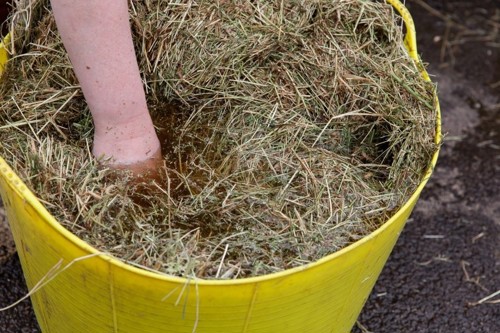
Haylage is generally lower in sugar than hay, but horses tend to do better on it because it’s often more digestible and provides higher levels of energy and protein. Due to this, it would be recommended to feed overweight horses soaked hay instead of haylage.
Forage replacement
chevron-down
chevron-up
Elderly horses or those with dental issues may need to be fed a forage replacement which is often a high fibre mash which can be easily chewed. It’s recommended to seek the advice of your vet or a nutritionist in this instance.
Feeding straw
chevron-down
chevron-up
Straw is often low in calories, high in fibre and can help to prolong feeding times, making it a good option for horses prone to weight gain or on a controlled diet but should only be fed to horses with good teeth. Straw should be clean, good quality and be introduced slowly to reduce the risk of colic.
Barley, oat and wheat straw are good alternatives as partial hay replacements. All three straw types are safe to feed to horses, but due to its softer texture, horses often prefer to eat barley or oat straw. In one study, horses lost up to 27kg through the winter period when 50% of their forage was replaced with straw3. For horses on a controlled diet, where applicable, be aware if straw is used as bedding as it may get eaten.
When you should feed straw:
- If your horse isn’t losing weight on soaked hay
- To increase the horse’s fibre intake with reduced calories
- Increase chewing time
- Prolong feeding time.
Due to straw’s lower nutritional value, it’s important to make sure that your horse is meeting their daily vitamin and mineral intake by feeding a balancer.
Succulents
chevron-down
chevron-up
Succulents include horse safe fruit and vegetables such as apples, carrots, swede, parsnips and turnips. Succulents add variety to a horse’s diet, are tasty for a treat and help encourage fussy eaters to eat their food. Succulents add additional calories to the diet and should be fed in moderation if your horse is overweight, has EMS or is prone to laminitis. Always slice succulents lengthways, never into circles or cubes, to reduce the risk of choke. This is where the oesophagus (the pipe which carries food down the throat to the stomach) becomes blocked. When used for certain types of enrichment it’s important to have someone present on the yard to monitor the horse. Succulents may not be suitable for horses with poor teeth due to difficulties with chewing the food sufficiently.
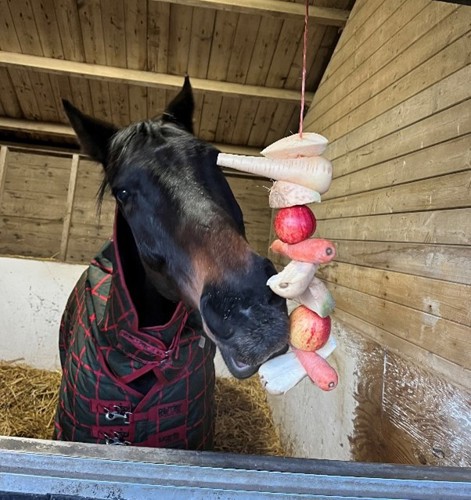
How much should you feed?
chevron-down
chevron-up
In an ideal world horses would have an adlib supply of forage 24/7 fed from ground level. However, this isn’t always realistic while trying to manage and maintain a healthy weight. It’s recommended that a horse should eat approximately 2% - 2.5% of their bodyweight per 24 hours to meet daily requirements4 and maintain their condition. A horse’s daily ration should be no less than 1.5% of their bodyweight. This could include a variety of grazing, supplementary forage and bucket feeds depending on the horse’s requirements.
To work out your horse’s daily requirement it’s useful to have an accurate body weight from a weighbridge. If this isn’t achievable, then the weight from a weigh tape is recommended as a guideline. Follow the below calculation to work out your horse’s daily requirement.
2 (%) ÷ 100 x Bodyweight (kg horse) = Total requirement in kg
For example, for a 500kg horse fed 2% of their bodyweight this would be:
2 (%) ÷ 100 = 0.02
0.02 x 500kg (bw) = 10kg
Total requirement per day = 10kg
Once the total requirement has been calculated this can be split down into what is going to be fed based on the individual’s needs. It’s important to be honest and realistic with what level of work your horse is in. Feeding too much high energy feed can lead to behavioural issues as well as conditions such as gastric ulceration and obesity. Most leisure and grass roots level horses can often maintain energy levels and a healthy weight from eating a high forage diet.
Considerations to feeding
Monitoring body condition
chevron-down
chevron-up
It’s important to monitor your horse’s body condition with regular fat scoring and weigh taping, this allows for adjustments to be made to the diet if needed.
If a horse is overweight, it’s advised to reduce the % in the above calculation to 2% - 1.5%. This is to reduce the calorie intake for the individual. It’s still incredibly important to provide forage throughout the day meaning that the reduced amount of forage needs to last the same amount of time or equally, look at feeding the same amount but with a reduced calorie content perhaps by soaking hay or replacing part of the ration with straw. This can be achieved by using small holed haynets, tying haynets where they’re allowed to swing freely or hay balls. Do not drop to less than 1.5% without a vet’s instruction to do so.
If a horse is found to be underweight and a vet has ruled out any potential underlying health conditions, then the % in the calculation can be increased to 2.5% - 3%. If the horse still requires more help to improve their condition, higher calorie forage or additional concentrate feeds may need to be considered.
Grazing intake
chevron-down
chevron-up
It’s very difficult to calculate how much grass your horse will eat during turnout. Studies have found ponies can consume up to 5% of their bodyweight when they have 24-hour access to pasture5, and up to 1% of their bodyweight within just three hours6.
Grass is a major contributor of calories in a horse’s diet. Grazing will need to be controlled in overweight horses, those with EMS, prone to weight gain or laminitis. Grazing can be controlled by using electric fencing to strip graze, setting up a track system or by using a grazing muzzle.
What to look out for on a feed bag
All feed companies must display certain information by law on their feed bags – this is called the statutory statement.
References
chevron-down
chevron-up
- Getty, J. (2009) Feed Your Horse Like a Horse.
- Rendle, D. et al., (2018) Equine Obesity: Current Perspectives. UK Vet Equine 2(5)
- Dosi, M. et al., (2020) Inducing weight loss in native ponies: is straw a viable alternative to hay? Veterinary Record. 187(8), Pp.60.
- Frape, D. (2008) Equine Nutrition and Feeding.
- Longland, A. et al., (2011) Estimation of pasture intake by ponies from liveweight change during six weeks at pasture. Equine Veterinary Journal. (31) Pp. 275-276.
- Longland, A. et al., (2016) Effects of grazing muzzles on intake of dry matter water soluble carbohydrates by ponies grazing spring, summer, and autumn swards, as well as autumn swards at different heights. Equine Veterinary Journal. (40) Pp. 26-33.

